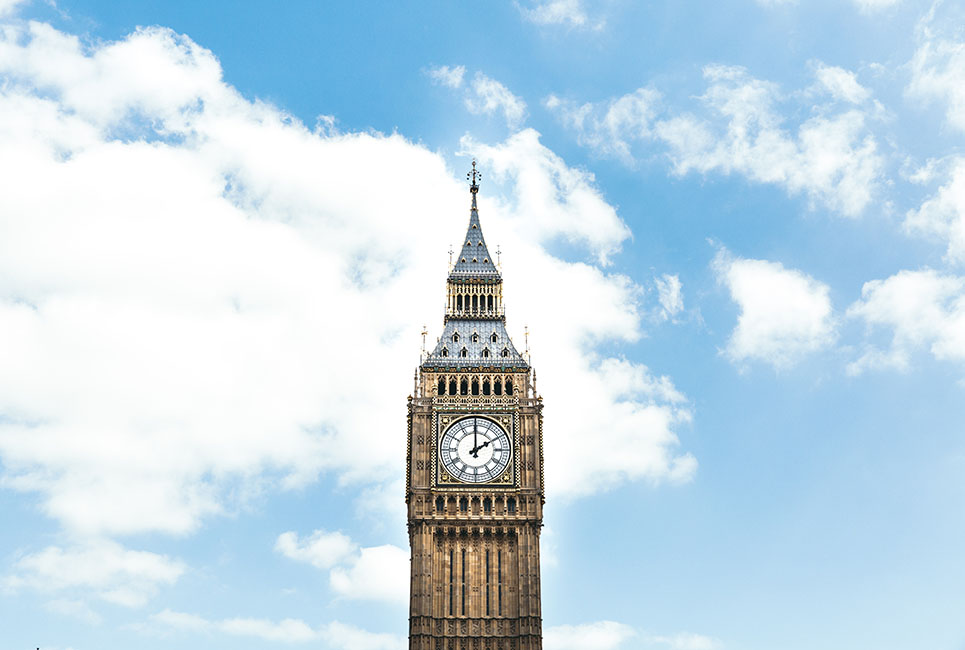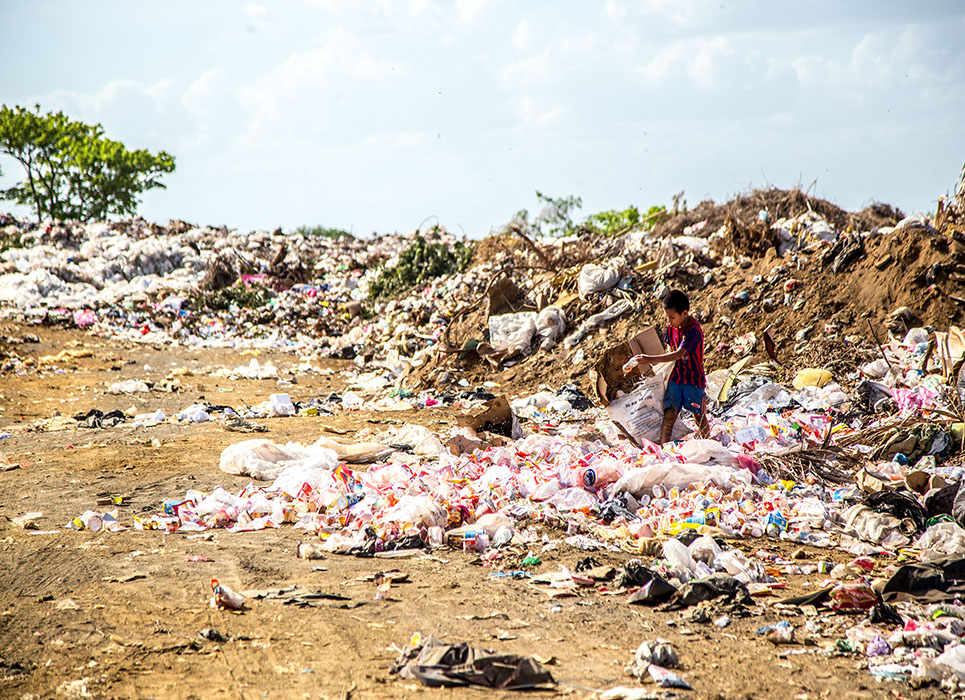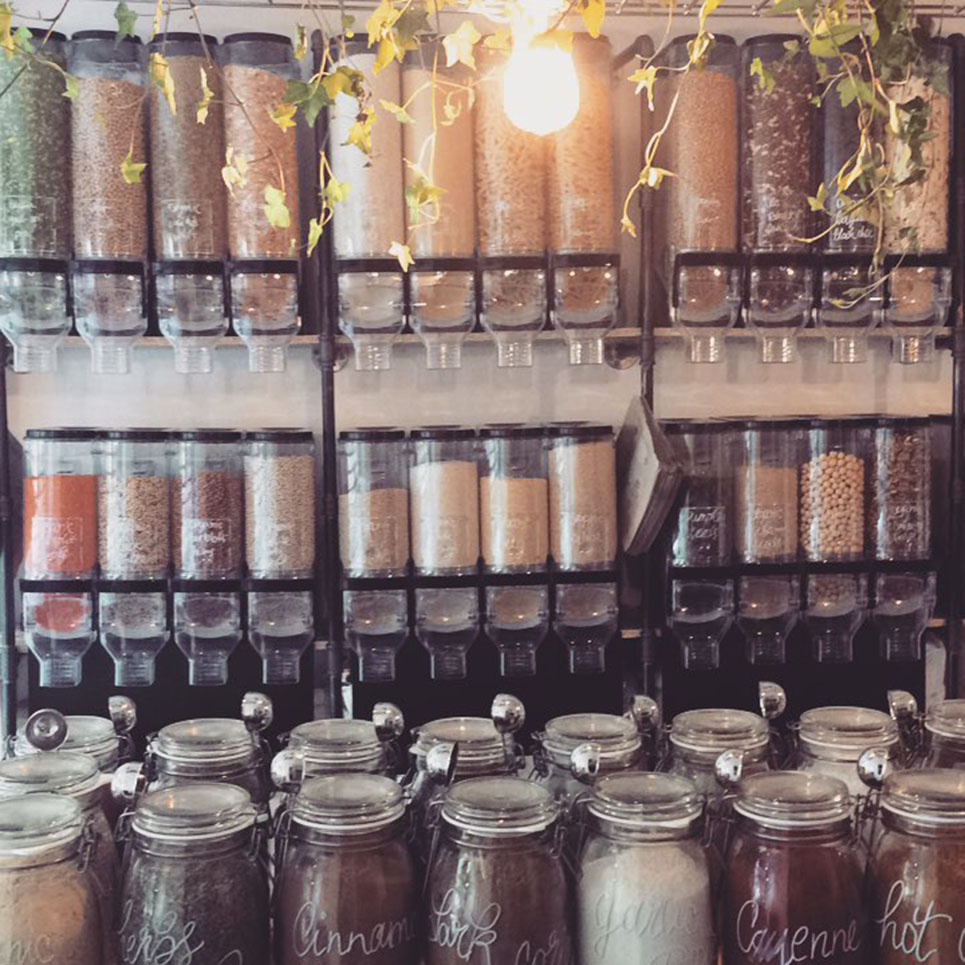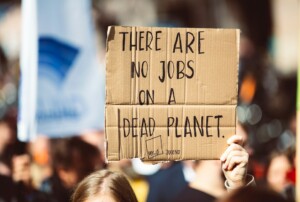
This article first appeared on Flor + Cesta
Before I started this journey, I had no idea of the true implications of our plastic consumption or really what this material is. Plastic is a material designed to last forever but it’s being used as a disposable product; disposable cups, cutlery, carrier bags, drinks bottles, food packaging etc.
I don’t know if you’ve ever noticed how much of your food shop goes in the bin as soon as you get home? The packaging our supermarkets are using is INSANE. And it’s charged to us; packaging costs add around 20% to the average annual food bill.
But the true cost is to the planet. According to recent data published by Wrap UK, the average recycling rate in Britain is 43%, way behind the 50% EU target. That means that 57% of resources are being landfilled, incinerated or finding ways to the ocean.
The amount of food waste generated by supermarkets and the supply chain network could end world hunger many times over.
Around a fifth of food brought into UK, homes ends up as waste, equating to 7.3 million tonnes.
Out of this, 4.4 million tonnes is defined as avoidable and has a retail value of £13 billion.
As William McDonough, a designer and sustainability guru, told a greenbiz.com last year, “It’s so immensely curious how stupid modern packaging is.” I couldn’t agree more!
I bring good news though; the tide is slowly changing on this and there are now petitions such as ‘A plastic free aisle’ on change.org which is urging supermarkets to create a plastic-free aisle in every store to prevent tons of waste packaging.
Is this enough though?
Related: How Tinia Pina is building a sustainable chemical free food system
BULK MARKET INTERVIEW
Personally, I don’t believe it is, so I was super excited to hear about a new fully zero waste supermarket about to launch in London.
Bulk Market will be selling everything from grains to beer, personal care products, and even pet food in bulk. The shopping experience will also be a far cry from traditional supermarkets: the products available will be brandless, sourced locally from other social enterprises, cooperatives, community farms or made on site, all sold in bulk or in reusable containers. This is so desperately needed and I cannot applaud its founder Ingrid Caldironi enough!
I caught up with a busy Ingrid this week to hear directly from her how Bulk Market came to be and why it is really a necessity that us, the consumer, start to think consciously about where and how we shop.

Tell me a bit about you
I’m 34, been living in London for 5 years now (I’m Italian/Brazilian), and I love this city so much. I’m married and I have a lovely miniature Schnauzer called Fuggle, named after a variety of Kent hops. I am a super beer geek and brew my own beer too! I started my own zero waste journey 2 years ago after reading an article about Lauren Singer and her 2 years of rubbish fitting in a jar. I was super inspired by her lifestyle and started researching everything I could about zero waste!
What was the inspiration for Bulk Market?
Bulk Market was born more out of necessity.
I’ve been struggling with my weekly shop since I’ve gone zero waste – in London, you can’t find everything in only one place, you need to travel to several places to be able to stock your fridge and cupboard, and I was so tired of that.
At work, I also felt that nobody was really sharing the same concerns with the environment as I do, and I had this strong gut feeling that I should do something that I truly believe in.
I didn’t want to stay in my 9-5 job which didn’t resonate with me anymore, I wanted to do something which would help other people. So here we are, a gal with her dog and big dreams.
What is the goal of Bulk Market and where do you see it going in the future?
I am super ambitious with this project.
The first obvious goal is to have a one-stop-shop for refills, helping people to reduce and reuse packaging to ultimately divert it from landfills.
The second is making a zero-waste lifestyle something more accessible.
This shouldn’t really be a niche thing that only people who can afford to can do. I believe one of the biggest issues is affordability of organic fresh veg and fruit.
My solution to this is sourcing Bulk Market’s fruit and veg locally from urban and community farms (London has the biggest concentration of city and community farms of any UK cities), so fruit & veg won’t travel from far, will be seasonal, won’t come heavily packaged and can be more affordable, plus the money will be kept within the neighbourhood.
The third point is taking care of the end-life of the products I will be supplying.
So, I will be offering a free of charge community composting scheme, something which cities like New York and San Francisco in the USA already do: people can freeze their food scraps until they have built up a few bags worth to bring to a drop off point at the store. I will have a commercial composter on site, which will transform all those scraps into rich soil, which then will be available for free, for people willing to grow their own food.
The last goal I aim to achieve is reconnecting people with food.
Our food system has created an anonymous chain that is inaccessible to us, and it’s disconnecting us from our food, its origin and, ultimately, nature. Plastic and packaging are a symbol of this disconnection.
To reconnect people with nature and on how food is made, I will have a working beehive on site, producing honey made from local Hackney bees. People will be able to visit the hive and see the hard work involved in making food!
What do you think is the biggest challenge we need to overcome in the UK in order to dramatically cut a number of resources we commit to landfill each year?
There are issues from different fronts. We have a behavioural issue, a throwaway culture that is addicted to cheap/disposable things and based heavily on convenience. People need to understand that there is a true cost for everything we consume, either social or environmental. Businesses like mine can make a dent in this problem. It’s difficult to expect people to change behaviour if that implies in too much effort.
Retailers really need to make this as easy for consumers as possible, and that’s my biggest aim.
There’s also an issue with public policies. Our Government doesn’t put the burden on recycling and recovering materials on the manufacturers, but on us instead. We pay with our taxes to haul, ship, burn and dispose of the rubbish created by the industry.
I see packaging as part of the product and who makes the product should be responsible for the disposal of it. Waste is purely poor design. Things aren’t designed with a circular approach yet, but slowly this is changing. There are a lot of like-minded entrepreneurs like Snact and Ooho Water shaking things up!
If you could say one thing to all the CEO’s of the major UK supermarkets what would it be?
The only way forward is aligning their companies with a circular approach, not green-washing. The current wasteful and unethical practices supermarkets operate to maximise profits are harmful to their brands – and people are watching.
Thank you so much for talking to Flor & Cesta Ingrid!
Bulk Market truly simplifies conscious shopping for consumers and is a true inspiration. I only hope the supermarkets sit up and listen.
Bulk Market is currently being crowdfunded. This initiative is for OUR community and it needs OUR support. Ingrid is currently crowdfunding on Spacehive. Please do go and pledge, it really will be worth your while. Ingrid is offering some great little goodies as well to those who pledge that can be redeemed once Bulk Market opens. Pledge here today.
The market had a soft launch from 26th August until 25th November, and after that, it will be hosted in a permanent location at Chatsworth Road in Hackney.
Related: How Tinia Pina is building a sustainable chemical free food system








